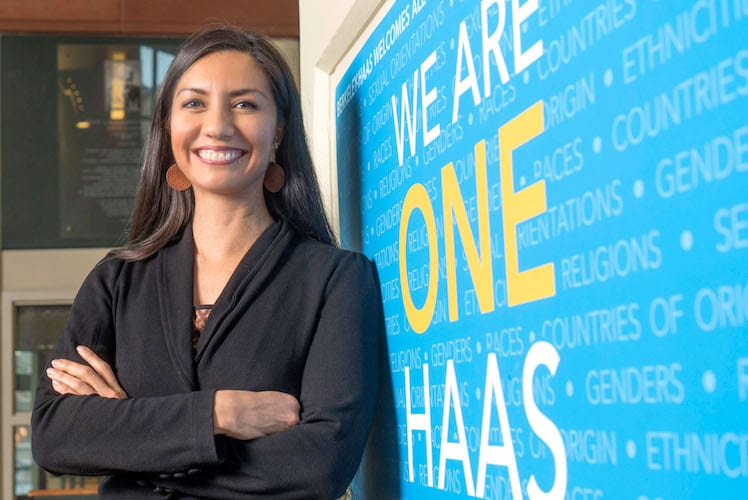
It was a chance friendship with a Taiwanese girl who offered to share her elementary school bus seat that gave Élida Bautista, incoming director of diversity & inclusion for Berkeley Haas, her first experience of “otherness.”
“My friend was a Buddhist, and she was the first person I was aware of who didn’t believe in a Christian god,” says Bautista, one of five siblings in a Mexican family who grew up in a Puerto Rican neighborhood in Chicago. “Until then, everyone in my world was a Catholic.”
After that day, Bautista says she stopped assuming things about people—and her life became an exploration of culture, language, food, and games of her classmates, who hailed from a wide range of countries from Korea to Greece.
On the path to diversity & inclusion
“I credit my Chicago roots with putting me on the diversity path,” says Bautista, who comes to Haas from UCSF’s Department of Psychiatry, where she spent 15 years developing programs focused on social justice, diversity, and inclusion.
In her new full-time job, which she started this month, Bautista will be setting school-wide strategy for inclusion, diversity, and equity-related efforts focused on students, equipping them to lead in diverse workplaces. She’ll also support students, faculty, and staff to build an inclusive school climate.
Jay Stowsky, senior assistant dean of instruction at Haas, says Bautista is an excellent fit for the position. “We welcome Élida’s wealth of experience in diversity and inclusion that she developed during her years supporting students in highly competitive professional programs,” he says. “Her experience aligns perfectly with our Haas culture, and we’re looking forward to the fresh ideas and programs that she will bring to our school.”
Bautista says she was drawn to Haas because the school culture aligns with her values—everything from its commitment to responsible business and social impact to the diversity of interests among the faculty and staff. “It felt good, it felt right here,” she says. “The folks here are ready to do the work and not just pay lip service.”
Clinical training
After earning a PhD in clinical psychology from the University of Michigan, Bautista joined UCSF, where she became an associate clinical professor, providing care to an under-served community of children and adolescents. “What was unique about the UCSF program is that it trained us to be culturally sensitive in the care we were providing,” she says. The job was an intense real-world application of what she’d learned.
Most recently, Bautista served as program director for UCSF’s Diversity & Inclusion Staff Certificate Program, building the selection process and curriculum, and teaching the seminars for staff interested in inclusion and diversity issues. Prior to that, Bautista directed UCSF’s Multicultural Clinical Training Program for doctoral students and medical residents at Zuckerberg San Francisco General Hospital. There, she created seminars and clinical rotations required for trainees to become clinicians and clinical supervisors. The program taught them to consider culture in their assessments of patients, and to manage clients from a point of view of class and culture.
Student leader
Bautista, who excelled academically from an early age, says she reaped the rewards of a solid education. That started when her elementary school principal nominated her as the only student in her Spanish-English program to be bused to a better-resourced school across the city.
When her family moved to Fillmore, a sleepy California agricultural town where her father, aunt, and uncle worked the fields, 13-year-old Bautista “joined every club” and was chosen for the UC Santa Barbara outreach program. As a student, she realized that the town was divided by class lines and that inequality harmed her peers. “In my college prep classes I started to realize that people were tracked and had different opportunities. Assumptions were being made about ability and intellect that disproportionately impacted Mexican students negatively.”
Finding her voice
As an undergraduate at the small Claremont McKenna College, she says she first encountered the feeling of being invisible, as one of two women in her freshman literature class. “I had gone from being a high school student leader to being that person in class feeling intimidated to speak up, not feeling this was my place.”
As she would throughout her life, Bautista turned to mentors for guidance. In this case, it was a kind professor who helped her find her voice in the class.
Bautista credits her Chicago roots with helping her to question the status quo, which is her favorite Berkeley Haas Defining Leadership Principle. Bautista says that students at Haas are also finding their voices every day, and she says she wants to help lead those efforts, as a mentor and a program director.
“My goal is to make sure that our students feel comfortable and supported on critical issues,” she says. “A climate that supports and values everyone is the climate that will continue to attract the best students to Haas.”